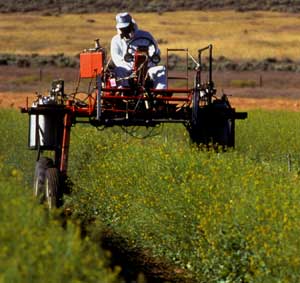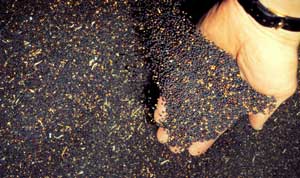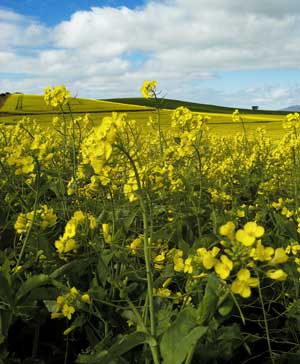Budding Opportunities in Canola




January 24, 2007
BY Ron Kotrba
For years, canola has been touted as a healthy oil alternative to hydrogenated or other virgin oils, which restaurateurs and processed-food makers use less frequently today in response to health-conscious consumers. Some food operations have switched to canola for its zero transfat and lower saturated-fats. The same benefits that canola offers to the food industry are what make it a success-in-the-waiting in the biodiesel industries in the United States and Canada. A cultivar of the European rapeseed plant, canola is North America's own low-acid variety of the flowering oilseed crop. Only slightly more than 550,000 metric tons of canola seed was grown stateside in this past crop year. With more than double the oil content of soybeans, though, canola oil is premium grade and a true candidate for the biodiesel industry … even if seed imports from Canada alleviate upward pricing pressure for potential U.S. canola growers wishing to bankroll on the crop's soaring demand.
Ninety percent of U.S. canola is grown in North Dakota. It's no accident that Archer Daniels Midland Co.'s (ADM) large canola crush facility is located in Velva, N.D. It's in the heart of that U.S. production area near the Canadian border, where virtually endless supplies of canola seed can enter the U.S. market tariff-free under the North American Free Trade Agreement (NAFTA). Assuming the United States grew 550,000 metric tons of canola and low-balling canola's average oil content at 40 percent, the amount of canola oil derived from U.S. stocks amounts to 220,000 metric tons. This amount of oil will produce just over 66 million gallons of canola-based biodiesel per year, well short of the 85 MMgy of canola biodiesel ADM proposes to refine in Velva starting in April 2007. In other words, one ADM biodiesel plant will require 130 percent of all U.S. canola production. To make the situation more interesting, other companies are planning similar large-scale operations with a preference for canola. These market dynamics are fostering a lot of interest in expediting a sharp rise in North Dakota canola production-in acres and yield-especially as hope mounts for this seemingly overnight demand to increase the value of canola.
Boosting Production with Research Partnerships
Bill Wilson, assistant director of North Dakota State University's (NDSU) Center of Excellence for AgBiotechnology: Oilseed Development, says the center is working with its partners to increase North Dakota's competitiveness in producing and processing specialty oils. Speaking at the Northern Canola Growers Association's mid-December Canola Biodiesel Forum in Minot, N.D., Wilson discussed the progress being made toward the center's goal. "Things are moving very fast," he told the audience of 200 canola farmers, in reference to the accelerated germplasm plan led by NDSU's Marcelo Melani.
"[NDSU's Department of Agriculture and Biosystems Engineering] evaluated 200 breeder lines of Monsanto [germplasm] in 2006," Wilson said. Additionally, Monsanto, the center's premier partner, expects to make a hundred more new lines available in 2007. Wilson stressed the importance of partnering with notable seed companies like Monsanto. ADM and Dakota Skies Biodiesel LLC, a company planning to build a 30 MMgy biodiesel plant in Minot, N.D,. using canola as a feedstock, also partner with the center, Wilson said. Monsanto provides the use of certain breeder lines for the center to develop further, after which the modified strain becomes property of the center and, eventually, the industry. "Monsanto provides us with cash, germplasm, the use of high-throughput analytical equipment, peer exchange and joint field trials," Wilson said.
The center's most promising results this past year in canola oil yield were 1,220 kilograms (2,646 pounds) of oil per hectare (a hectare equals 2.47 acres) compared with the commercial strain control yield of 1,060 kilograms (2,337 pounds) per hectare, representing an oil increase of 15 percent. "One of our goals is to increase oil content by 20 percent [total]," Wilson said, adding that his group hopes to meet that goal in 2007.
ADM Situates Biodiesel Colossus in Canola Country
Approached by a canola farmer at the NCGA's Canola Biodiesel Forum, Erik Mack, merchandiser for ADM's Velva facility, was told, "You need to buy more acres." Obviously, this soothsayer was referring to the huge demand ADM is putting on canola supplies. Even though Wilson says research and development projects to boost canola production in the state are moving fast, it would take considerable time before area canola growers can be expected to supply ADM with all of the feedstock it requires for biodiesel production.
"Last year, the United States produced approximately 557,000 [metric] tons of canola," Mack says. "But we crushed 1.3 million [metric] tons. We import a lot of seed from Canada." ADM, however, is providing a mechanism to allow skeptical farmers the means to boost canola production without worries of a potential bust due to poor weather.
"This year, for 2007, we are starting with act of god contracts," Mack said in a presentation at the forum. "We're targeting high yield and hybrid varieties of canola." He said ADM hopes this "comfort factor" will provide somewhat of a safety net for marginal canola farmers or those hesitant to grow more canola than usual in case they experience one of those bad years for canola growing, which some farmers say there a fifty-fifty chance of every year. Mack told forum attendees the act of god contracts will cover up to 1,000 pounds per acre for approved canola varieties. "There would also need to be proof of new purchase and variety of seed required," he explained. "We would need a legal land description, right of refusal and proof of loss if there was any loss." He said ADM aims to keep the act of god price close to the cash price, which is $13 to $13.50 per hundred-pound weight. "With these higher prices, we own canola farther out forward than we ever did," Mack said. "I don't see us running out of canola. The crush isn't going to jump up huge, but a Louis Dreyfus plant in York (N.D.) might pick things up." Even if soybeans are used in York, that means added competition for canola acres.
He romanticized about Canada's canola crush, bringing attention once again to that country's plethora of oil-rich seed. Canada produced around 9.1 million metric tons this past year, exporting 5.4 million (nearly 60 percent) of those whole seeds, he said. "All the stars were in alignment for them in Canada last year," Mack said. "They had a 3.5 million-metric-ton crush in Canada, one of the highest crush levels ever."
Additional Factors in Play
Northern Prairie EnviroFuels LLC is a proposed canola-based oil extraction and biodiesel refinery complex hoping to locate in Cavalier County, N.D. "We're in the feasibility stage now," Project Manager Mark Luther told forum attendees. "The LLC (limited liability company) is formed, and we have a nine-person board of directors named, which might be expanded to add a Canadian member, … and we have a site optioned." As the feasibility study is being wrapped up, Luther said preliminary engineering is underway. What's being examined in the ongoing study includes canola feedstock availability, existing grain storage on farms and at elevators to avoid duplicate storage, transportation infrastructure, and more. A concern Luther stressed was competition for canola coming from other facilities, and food processors or restaurant chains like Taco Bell choosing to use canola oil.
The proposed canola crush and refining complex anticipates the need for 275,000 tons to 300,000 tons of canola seed per year grown on an expected 400,000 acres of land, in order to extract 30 MMgy of canola oil per year for biodiesel production. "We are seeking North Dakota canola production as our primary source, but we'll also look to Canada," Luther said.
While Northern Prairie EnviroFuels works to complete its feasibility study, a man who knows all about feasibility studies-Mark Soutter, chemist and technical analyst with BBI International Project Development-also presented to the canola growers at the Canola Biodiesel Forum. "This is a novel industry and it's pushing a lot of boundaries," Soutter said. "U.S. soy biodiesel has the potential to make up 1 billion to 1.5 billion gallons a year without completely destroying the soy markets." He mentioned canola's superior properties as a feedstock for biodiesel, like its 24 degree Fahrenheit cold filter plugging point (CFPP) compared with soy's 28 degree CFPP, palm's 55 degree CFPP, and tallow's 58 degree CFPP, which is high enough to congeal on a cool summer night in North Dakota.
Unless U.S. canola acreage increases significantly, Canadian imports might detract from the U.S. federal government's goal to increase domestic energy production. Although Canada isn't Saudi Arabia, importing feedstock closely resembles importing crude oil and refining gasoline in Texas. Gasoline, while perhaps refined in Texas, isn't considered a domestic product unless the feedstock comes from the United States, and is refined here, as well.
Whether canola pans out for U.S. farmers remains to be seen, but expectations are high amidst any concerns. On upcoming U.S. canola crop years and ADM's huge demand on the oilseed, Mack said, "It's going to get interesting down the road on how this all works out."
Ron Kotrba is a Biodiesel Magazine staff writer. Reach him at rkotrba@bbibiofuels.com or (701) 746-8385.
Ninety percent of U.S. canola is grown in North Dakota. It's no accident that Archer Daniels Midland Co.'s (ADM) large canola crush facility is located in Velva, N.D. It's in the heart of that U.S. production area near the Canadian border, where virtually endless supplies of canola seed can enter the U.S. market tariff-free under the North American Free Trade Agreement (NAFTA). Assuming the United States grew 550,000 metric tons of canola and low-balling canola's average oil content at 40 percent, the amount of canola oil derived from U.S. stocks amounts to 220,000 metric tons. This amount of oil will produce just over 66 million gallons of canola-based biodiesel per year, well short of the 85 MMgy of canola biodiesel ADM proposes to refine in Velva starting in April 2007. In other words, one ADM biodiesel plant will require 130 percent of all U.S. canola production. To make the situation more interesting, other companies are planning similar large-scale operations with a preference for canola. These market dynamics are fostering a lot of interest in expediting a sharp rise in North Dakota canola production-in acres and yield-especially as hope mounts for this seemingly overnight demand to increase the value of canola.
Boosting Production with Research Partnerships
Bill Wilson, assistant director of North Dakota State University's (NDSU) Center of Excellence for AgBiotechnology: Oilseed Development, says the center is working with its partners to increase North Dakota's competitiveness in producing and processing specialty oils. Speaking at the Northern Canola Growers Association's mid-December Canola Biodiesel Forum in Minot, N.D., Wilson discussed the progress being made toward the center's goal. "Things are moving very fast," he told the audience of 200 canola farmers, in reference to the accelerated germplasm plan led by NDSU's Marcelo Melani.
"[NDSU's Department of Agriculture and Biosystems Engineering] evaluated 200 breeder lines of Monsanto [germplasm] in 2006," Wilson said. Additionally, Monsanto, the center's premier partner, expects to make a hundred more new lines available in 2007. Wilson stressed the importance of partnering with notable seed companies like Monsanto. ADM and Dakota Skies Biodiesel LLC, a company planning to build a 30 MMgy biodiesel plant in Minot, N.D,. using canola as a feedstock, also partner with the center, Wilson said. Monsanto provides the use of certain breeder lines for the center to develop further, after which the modified strain becomes property of the center and, eventually, the industry. "Monsanto provides us with cash, germplasm, the use of high-throughput analytical equipment, peer exchange and joint field trials," Wilson said.
The center's most promising results this past year in canola oil yield were 1,220 kilograms (2,646 pounds) of oil per hectare (a hectare equals 2.47 acres) compared with the commercial strain control yield of 1,060 kilograms (2,337 pounds) per hectare, representing an oil increase of 15 percent. "One of our goals is to increase oil content by 20 percent [total]," Wilson said, adding that his group hopes to meet that goal in 2007.
ADM Situates Biodiesel Colossus in Canola Country
Approached by a canola farmer at the NCGA's Canola Biodiesel Forum, Erik Mack, merchandiser for ADM's Velva facility, was told, "You need to buy more acres." Obviously, this soothsayer was referring to the huge demand ADM is putting on canola supplies. Even though Wilson says research and development projects to boost canola production in the state are moving fast, it would take considerable time before area canola growers can be expected to supply ADM with all of the feedstock it requires for biodiesel production.
"Last year, the United States produced approximately 557,000 [metric] tons of canola," Mack says. "But we crushed 1.3 million [metric] tons. We import a lot of seed from Canada." ADM, however, is providing a mechanism to allow skeptical farmers the means to boost canola production without worries of a potential bust due to poor weather.
"This year, for 2007, we are starting with act of god contracts," Mack said in a presentation at the forum. "We're targeting high yield and hybrid varieties of canola." He said ADM hopes this "comfort factor" will provide somewhat of a safety net for marginal canola farmers or those hesitant to grow more canola than usual in case they experience one of those bad years for canola growing, which some farmers say there a fifty-fifty chance of every year. Mack told forum attendees the act of god contracts will cover up to 1,000 pounds per acre for approved canola varieties. "There would also need to be proof of new purchase and variety of seed required," he explained. "We would need a legal land description, right of refusal and proof of loss if there was any loss." He said ADM aims to keep the act of god price close to the cash price, which is $13 to $13.50 per hundred-pound weight. "With these higher prices, we own canola farther out forward than we ever did," Mack said. "I don't see us running out of canola. The crush isn't going to jump up huge, but a Louis Dreyfus plant in York (N.D.) might pick things up." Even if soybeans are used in York, that means added competition for canola acres.
He romanticized about Canada's canola crush, bringing attention once again to that country's plethora of oil-rich seed. Canada produced around 9.1 million metric tons this past year, exporting 5.4 million (nearly 60 percent) of those whole seeds, he said. "All the stars were in alignment for them in Canada last year," Mack said. "They had a 3.5 million-metric-ton crush in Canada, one of the highest crush levels ever."
Additional Factors in Play
Northern Prairie EnviroFuels LLC is a proposed canola-based oil extraction and biodiesel refinery complex hoping to locate in Cavalier County, N.D. "We're in the feasibility stage now," Project Manager Mark Luther told forum attendees. "The LLC (limited liability company) is formed, and we have a nine-person board of directors named, which might be expanded to add a Canadian member, … and we have a site optioned." As the feasibility study is being wrapped up, Luther said preliminary engineering is underway. What's being examined in the ongoing study includes canola feedstock availability, existing grain storage on farms and at elevators to avoid duplicate storage, transportation infrastructure, and more. A concern Luther stressed was competition for canola coming from other facilities, and food processors or restaurant chains like Taco Bell choosing to use canola oil.
The proposed canola crush and refining complex anticipates the need for 275,000 tons to 300,000 tons of canola seed per year grown on an expected 400,000 acres of land, in order to extract 30 MMgy of canola oil per year for biodiesel production. "We are seeking North Dakota canola production as our primary source, but we'll also look to Canada," Luther said.
While Northern Prairie EnviroFuels works to complete its feasibility study, a man who knows all about feasibility studies-Mark Soutter, chemist and technical analyst with BBI International Project Development-also presented to the canola growers at the Canola Biodiesel Forum. "This is a novel industry and it's pushing a lot of boundaries," Soutter said. "U.S. soy biodiesel has the potential to make up 1 billion to 1.5 billion gallons a year without completely destroying the soy markets." He mentioned canola's superior properties as a feedstock for biodiesel, like its 24 degree Fahrenheit cold filter plugging point (CFPP) compared with soy's 28 degree CFPP, palm's 55 degree CFPP, and tallow's 58 degree CFPP, which is high enough to congeal on a cool summer night in North Dakota.
Unless U.S. canola acreage increases significantly, Canadian imports might detract from the U.S. federal government's goal to increase domestic energy production. Although Canada isn't Saudi Arabia, importing feedstock closely resembles importing crude oil and refining gasoline in Texas. Gasoline, while perhaps refined in Texas, isn't considered a domestic product unless the feedstock comes from the United States, and is refined here, as well.
Whether canola pans out for U.S. farmers remains to be seen, but expectations are high amidst any concerns. On upcoming U.S. canola crop years and ADM's huge demand on the oilseed, Mack said, "It's going to get interesting down the road on how this all works out."
Ron Kotrba is a Biodiesel Magazine staff writer. Reach him at rkotrba@bbibiofuels.com or (701) 746-8385.
Advertisement
Advertisement
Advertisement
Advertisement
Upcoming Events





